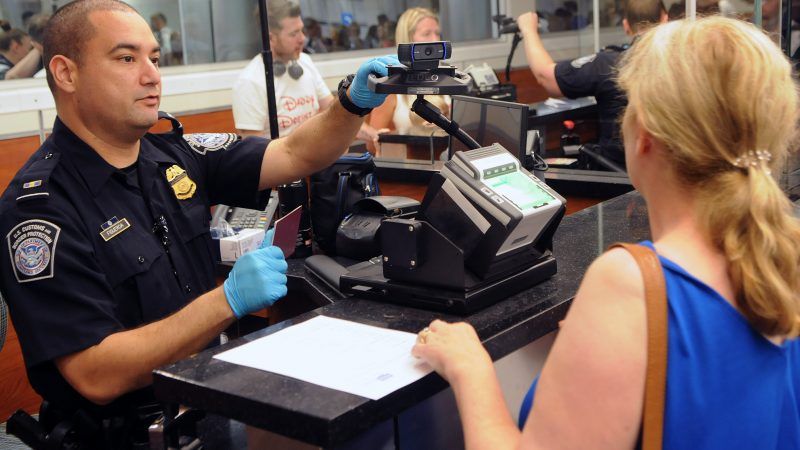U.S. Used Facial Recognition on Millions of Air Travelers Last Year, Found No Imposters
Plus: Biden won't pursue Trump's TikTok and WeChat bans, Mitt Romney's child allowance plan, and more...

Despite using facial recognition technology on millions of air travelers last year, U.S. Customs and Border Protection (CBP) caught not a single identity imposter at American airports. Since 2018, airport CBP officers have only "intercepted seven impostors," according to a new report from the agency. That's something to keep in mind as the feds continue to build out biometric databases and officials champion their use as a vital national security step.
In that same CBP report, the agency reveals that it scanned the faces of some 23 million travelers in and out of the U.S. via airplanes, boats, and foot travel in fiscal year 2020 (that's October 2019 through September 2020). But "the system caught no imposters traveling through airports last year and fewer than 100 new pedestrian imposters," reports Dave Gershgorn at OneZero.
That's 100 people out of nearly 8 million pedestrian facial scans run last year. (Or, put another way, 0.001 percent of the pedestrian scans identified imposters.) Since 2018, 295 foot travelers with fake documents were found, the CBP report notes.
The report provides a frightening glimpse of where this all going: a world where traditional travel and identity documents are replaced entirely with biometric data scans.
At airports, CBP has "expanded the use of Simplified Arrival, a process that…verifies a traveler's identity biometrically and retrieves traveler records from CBP systems using the traveler's face," says the report. "Simplified Arrival is the first step in re-envisioning how travelers arrive in the United States." (Emphasis added.)
CBP used the "Simplified Arrival" program at 18 airports last year and "operated biometric exit technical solutions" at 20 more airports.
Additionally, border patrol agents have been piloting an expanded biometric surveillance program in conjunction with the Transportation Security Administration (TSA). "The pilot will assist in developing future plans for the use of biometric facial comparison technology at TSA checkpoints," the new CBP report says.
And CBP is working to bring facial recognition technology to bear on more U.S. roadways and cruise ships, too:
CBP is piloting biometric capabilities at the land border in both the pedestrian and vehicle environments and in partnership with the cruise line industry in the sea environment. During FY2020, nearly 8 million pedestrian travelers were processed at seven ports of entry. Similarly, in the sea environment, nearly 1 million travelers were processed at seven seaports. In 2020, seven major cruise lines were engaged with CBP to develop facial biometric processing for closed-loop cruises.
OneZero provides a little more background:
The rollout of facial recognition at U.S. borders has its roots in a 1996 congressional mandate that the attorney general develop a system to track the entry and exit of foreign citizens to the U.S. In 2001, the PATRIOT Act expanded this entry/exit system, adding a requirement that this tracking be done by biometrics, meaning through fingerprint, iris, or facial recognition. The CBP subsequently took over these efforts and, in 2013, put a plan in motion to use facial recognition.
CBP started releasing data on its facial recognition rollout in 2019. It revealed that in 2018, 8.3 million people were scanned at borders. However, the program's implementation has been met with skepticism from the Government Accountability Office (GAO). In late 2020, the oversight organization lambasted CBP over lackluster accuracy audits, poor signage notifying the public the technology is being used, and little information offered to the public on how its systems worked.
QUICK HITS
• Leaving aside former President Donald Trump's role in rallying the Capitol rioters, "his reaction to it was enough to justify impeachment," writes Reason's Jacob Sullum.
• Republican senators who are supposed to impartially vote on Trump's impeachment are also helping develop his defense strategy. From The Hill:
Sens. Ted Cruz (Texas), Mike Lee (R-Utah) and Lindsey Graham (R-S.C.) were spotted entering the meeting, which took place in a room near the Senate chamber that Trump's team is using as a workspace.
Cruz told reporters after the meeting that they were talking strategy for the defense's opening arguments on Friday.
"We were discussing their legal strategy and sharing our thoughts," Cruz said.
• Veronique de Rugy on what's wrong with Sen. Mitt Romney's (R–Utah) child care plans.
• Google said it will leave Australia if a new proposal where it must pay to link to news articles becomes law. Google competitor Microsoft says it wants us to enact the same disastrous plan here.
• The Biden administration is backing off plans to ban TikTok and WeChat.
